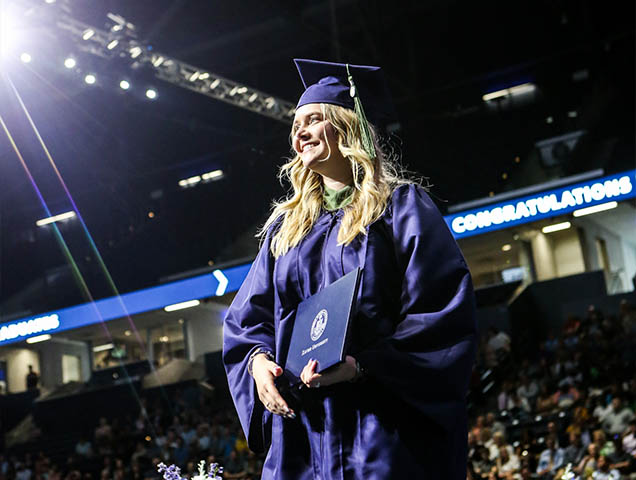Neuroscience
Program Details
Are you curious about the complexities of the human brain? As a student in the neuroscience major at Xavier, you'll embark on a fascinating journey into the intricacies of the nervous system. You'll explore the brain, spinal cord and nerves, unraveling the mysteries of how they function and shape our thoughts, emotions and behaviors. This interdisciplinary field combines biology and psychology, offering a comprehensive understanding of the human mind.
Xavier University, located in Cincinnati, Ohio, is nationally recognized as a top university by U.S. News & World Report and The Princeton Review. 98 percent of our students are working, volunteering or in graduate school within six months of graduation (Class of 2023).
Degree Awarded
Bachelor of Science in Neuroscience
Curriculum
The sample course sequence below illustrates class offerings for the Neuroscience major. Consult the official Xavier University course catalog for detailed registration and advising information.
Fall
- BIOL 160: General Biology I ............ 3cr.
- BIOL 161: General Biology I Lab............ 1cr.
- CHEM 160: General Chemistry I............ 3cr.
- CHEM 161 General Chemistry I Lab............ 1cr.
- PSYC 130: Psych-Science Perspective............ 2cr.
- PSYC 131: Psych-Science Perspective Lab............ 1cr.
- THEO 111: Theological Foundations ............ 3cr.
- CORE 101: Goa I............ 0cr.
Spring
- BIOL 162: General Biology II............ 3cr.
- BIOL 163: General Biology II Lab............ 1cr.
- CHEM 162: General Chemistry II............ 3cr.
- CHEM 163: General Chemistry II Lab............ 1cr.
- Mathematical Perspectives Elective............ 3cr.
- CORE 100: First Year Seminar............ 3cr.
- CORE 101: Goa I............ 0cr.
Fall
- PSYC 210: Psych Statistics OR STAT 146: Biostatistics ............ 3cr.
- BIOL 204: Functional Neuroscience............ 3cr.
- BIOL 206: Human Physiology............ 3cr.
- BIOL 207: Human Physiology Lab............ 1cr.
- Second Language Elective I ............ 3cr.
- ENGL 101: English Composition............ 3cr.
- BIOL 299: Professional Communications in the Sciences............ 1cr.
Spring
- BIOL 380: Neurobiology............ 3cr.
- BIOL 230: Genetics ............ 3cr.
- BIOL 231: Genetics Laboratory ............ 1cr.
- Creative Perspectives Elective ............ 3cr.
- Second Language Elective II............ 3cr.
- PHIL 100: Intro to Ethics ............ 3cr.
Fall
- PSYC 220: Psychological Research ............ 3cr.
- PSYC 427: Cognitive Psychology............ 3cr.
- Neuroscience Elective ............ 3cr.
- ENGL 205: Literature and Moral Imagination............ 3cr.
- General Elective............ 3cr.
Spring
- Neuroscience Elective OR BIOL 360: Cell Biology............ 3cr.
- PSYC 435: Brain and Behavior............ 3cr.
- HIST 199: Historical Perspective Elective ............ 3cr.
- PHIL 200: Philosophical Perspective Elective ............ 3cr.
- General Elective............ 3cr.
Fall
- Capstone (≥ 2 credits required)............ 2cr.
- Neuroscience Elective............ 3cr.
- Theological Perspective Elective ............ 3cr.
- Humanities Elective ............ 3cr.
- General Elective ............ 3cr.
Spring
- Capstone (≥ 2 credits required)............ 2cr.
- Neuroscience Elective OR BIOL 360: Cell Biology............ 3cr.
- Neuroscience Elective............ 3cr.
- E/RS Flag Elective ............ 3cr.
- Solidarity and Kinship Flag Elective............ 3cr.
- General Elective............ 3cr.
Sample Courses
As a student in the Neuroscience major, you might take some of the following courses:- Functional Neuroscience (BIOL 204): Explore the anatomy of the nervous system, from brain regions to spinal nerves. Learn how these structures relate to specific functions and work together as a system. Discover sensory and motor systems, the autonomic nervous system, limbic function, memory, and relevant neurological conditions.
- Human Physiology (BIOL 206): Investigate the organ systems of the human body, including how the nervous system interacts with the gut, muscles, glands and more.
- Neurobiology (BIOL 380): Gain a deep understanding of the building blocks of the nervous system: neurons and glial cells. Understand how these cells organize into functional circuits that process information and shape behavior.
- Brain and Behavior (PSYC 435): Explore the brain's role in behavior, including topics like learning, memory, emotions, language, cognition, sleep, mental disorders, violence, and addiction. Learn about brain-based treatments for behavioral and mental health issues.
- Cognitive Psychology (PSYC 427): Discover key concepts, theories and research in attention, memory, problem-solving, language and decision-making. You'll gain a deep understanding of the theoretical and empirical foundations of these cognitive processes.
Career Outcomes
High Student Success RateAt Xavier, your career aspirations are supported by a strong network of faculty and staff. 98% of our students are working, volunteering or in graduate school within six months of graduation (Class of 2023). Additionally, our students have an 86% acceptance rate to medical schools (5-year average, Class of 2022), compared to 40% nationally.
Career OptionsWith a neuroscience degree, you'll be well-prepared for a variety of rewarding careers, including: Laboratory Technician, Research Assistant, Research Scientist and Clinical Research Coordinator. You’ll also be prepared to enter graduate programs in science, health and psychology. Investigate the organ systems of the human body, include how the nervous system interacts with the gut, muscles, glands, and more.
Career DevelopmentMore: Xavier's Career Development Office assists students in their search for employment by offering individual career counseling sessions, conducting workshops and maintaining an employer database. More than 100 nationally known companies visit the campus annually to interview graduating seniors for open positions.
Student Clubs
Creating an on-campus community with your classmates is essential to your undergraduate studies. Not only does this enrich your life at Xavier, but it can also foster future professional connections, boost your résumé and strengthen your interpersonal skills. As a student in the Neuroscience major, you might be interested in:
- Alpha Epsilon Delta (Pre-Med Honor Society)- As a junior or senior, join this national pre-health honor organization and make a difference in the Cincinnati community by volunteering at places like the Ronald McDonald House and Cincinnati Children's Hospital.
- Biology Club- Connect with like-minded biology majors and enthusiasts in this vibrant community. Explore your passion for biology, engage in hands-on learning and network with professionals in the field.
- Minorities in STEM Succeeding Together- Find a supportive community where you can thrive, connect with peers, and build confidence in your identity while pursuing excellence in STEM.
- Pre-Med Student Association- Join this club if you're interested in a career in the health professions. Attend bimonthly events, network with medical professionals and collaborate with upperclassmen on the pre-med track.
- Psi Chi/Psychology Club- Explore psychology through the Psi Chi/Psychology club. The Psi Chi chapter is an official chapter of the National Honor Society of Psychology, while the Psychology Club is open to all students of any major or minor. Both clubs work as one to increase awareness for and interest in psychology.
When we seek something more, we become something greater.
Find more information about how you can become a Musketeer.
Request InformationCollaborate on Ground-Breaking Research Projects

Our undergraduate research program offers you the chance to dive deeper into topics that interest you most. Gain valuable hands-on experience, develop critical research skills and contribute to the ever-expanding field of neuroscience.
Courses Taught in the Jesuit Tradition

A Jesuit education provides you with a strong foundation in the field of neuroscience, while also equipping you with the ethical, intellectual and personal skills needed to make a positive impact in the world.
Achieve Your Health Career Goals

Boost your chances of getting into medical school— our students have an 86% medical school acceptance rate, compared to 40% nationally. Neuroscience students interested in medicine or other health professions should also declare the Biomedical Sciences minor.